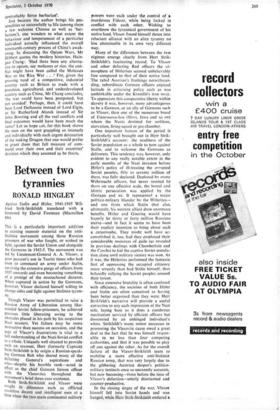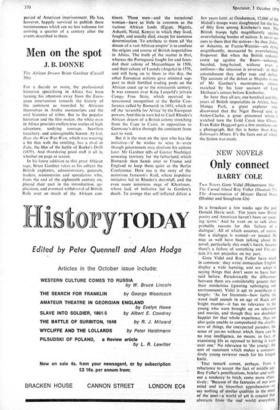Between two tyrannies
RONALD HINGLEY
Against Stalin and Hitler, 1941-1945 Wil- fried StnIr-Strikfeldt translated with a foreword by David Footman (Macmillan 60s) This is a particularly important addition to existing memoir material on the anti- Stalinist movement among those Russian prisoners of war who fought, or wished to fight, against the Soviet Union and alongside the Germans in 1942-5. The movement was led by Lieutenant-General A. A. Vlasov, a poor peasant's son in Tsarist times who had risen to command an army under Stalin, surviving the extensive purge of officers from 1937 onwards and even becoming something of a protege of the mustachioed dictator. When captured in action by the Germans, however, Vlasov declared himself willing to change sides and fight against Stalinist tyran- ny.
Though Vlasov was permitted to raise a Russian Army of Liberation among like- minded Soviet fellow-prisoners, he achieved precious little liberating owing to the obstacles placed in his path by his suspicious Nazi masters. Yet failure may be more instructive than success on occasion, and the saga of Vlasov's frustrations is vital to a full understanding of the Nazi-Soviet conflict as a whole. Uniquely well situated to provide, such an account, Herr (formerly Captain) Strik-Strikfeldt is by origin a Russian-speak- ing German Bait who shared many of the defecting General's aspirations and who—despite his humble rank—acted in effect as the chief German liaison officer With the Vlasovites throughout the movement's brief three-year existence. Both Strik-Strikfeldt and Vlasov were caught in dilemmas such as afflicted countless decent and intelligent men at a time when the two main continental military powers were each under the control of a murderous Fiihrer, while being locked in conflict with each other. Wishing to overthrow the tyrannical government of his native land, Vlasov found himself thrust into reluctant alliance with an alien tyranny no less abominable in its own very different way.
Many of the differences between the two regimes emerge clearly from Herr Strik- Strikfeldt's fascinating record. To Vlasov and other defecting Red officers the at- mosphere of Hitlerism seemed unbelievably free compared to that of their native land. The rabid Austrian's frothings notwithstan- ding, subordinate German officers enjoyed latitude in criticising policy such as was unthinkable under the Kremlin's iron sway. To appreciate this comparative liberty within slavery it was, however, more advantageous to be a German, or an ally of Germans such as Vlasov, than one of the numerous breed of Untermenschen (Slays, Jews and so on) whom the Nazis destined for serfdom, starvation, firing-squad or gas chamber.
One important feature of the period is particularly well brought out in Herr Strik- Strikfeldt's account: the readiness of the Soviet population as a whole to turn against Stalin, and to welcome the Germans as deliverers. This tendency was, however, only evident to any really notable extent in the early months of the Nazi invasion before Hitler's policy of ill-treating the orrupied Soviet peoples, fifty to seventy million of them, was fully declared. Deplored by many Wehrmacht officers, but never resisted by them on any effective scale, the brutal and idiotic persecution was applied by the Gestapo and ss. It represented a major politico-military blunder by the Hitlerites- and one from which Stalin (but also, ultimately, his western allies) drew enormous benefits. Hitler and Goering would have happily let thirty or forty million Russians starve—and in fact it seems to have been their explicit intention to bring about such a catastrophe. They might well have ac- complished it, too, had they employed their considerable resources of guile (as revealed in previous dealings with Chamberlain and the Czechs) to kid the captive Soviet popula- tion along until military victory was won. As it was, the Hitlerites performed the fantastic feat of oppressing the occupied citizenry more severely than had Stalin himself, thus belatedly rallying the Soviet peoples around their tyrant.
Since extensive brutality is often confused with efficiency, the societies of both Hitler and Stalin are often conceived as having been better organised than they were. Herr Strikfeldt's narrative will provide a useful corrective to any such impression of the Nazi side, laying bare as it does a cumbrous mechanism serviced by efficient officers but dominated by an unhinged individual's whim. Strikfeldt's many minor successes in promoting the Vlasovite cause owed a great deal to the fact that he was himself respon- sible to no less than four competing authorities, and that it was possible to play off one against the other. As for the overall failure of the Vlasov-Strikfeldt team to mobilise a more effective anti-Stalinist Russian army, that was very largely due to the gibbering Austrian despot's politico- military instincts once so uncannily accurate, but now becoming—from before the time of Vlasov's defection—utterly disoriented and counter-productive.
In the closing stages of the war, Vlasov himself fell into Soviet hands and was hanged, while Herr Strik-Strildeldt endured a
period of American imprisonment. He has, however, happily survived to publish these reminiscences which are no less welcome for arriving a quarter of a century after the events described in them.







































 Previous page
Previous page